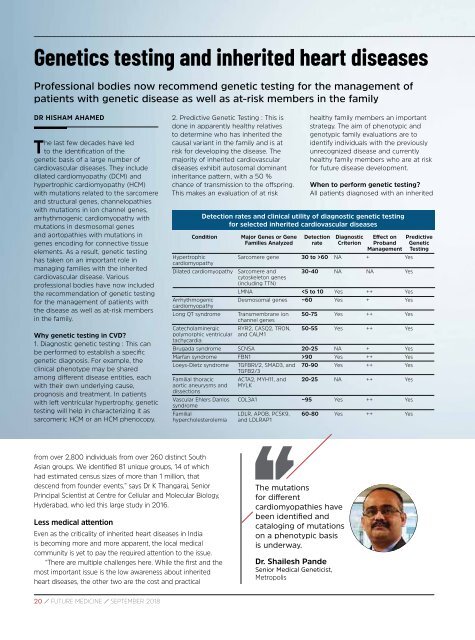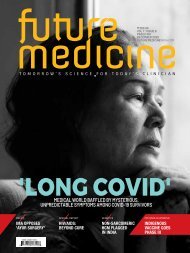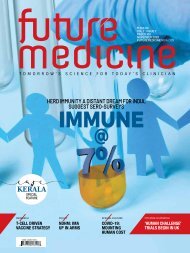FM SEPTEMBER 2018 ISSUE - digital edition
Create successful ePaper yourself
Turn your PDF publications into a flip-book with our unique Google optimized e-Paper software.
slug<br />
Genetics testing and inherited heart diseases<br />
Professional bodies now recommend genetic testing for the management of<br />
patients with genetic disease as well as at-risk members in the family<br />
DR HISHAM AHAMED<br />
The last few decades have led<br />
to the identification of the<br />
genetic basis of a large number of<br />
cardiovascular diseases. They include<br />
dilated cardiomyopathy (DCM) and<br />
hypertrophic cardiomyopathy (HCM)<br />
with mutations related to the sarcomere<br />
and structural genes, channelopathies<br />
with mutations in ion channel genes,<br />
arrhythmogenic cardiomyopathy with<br />
mutations in desmosomal genes<br />
and aortopathies with mutations in<br />
genes encoding for connective tissue<br />
elements. As a result, genetic testing<br />
has taken on an important role in<br />
managing families with the inherited<br />
cardiovascular disease. Various<br />
professional bodies have now included<br />
the recommendation of genetic testing<br />
for the management of patients with<br />
the disease as well as at-risk members<br />
in the family.<br />
Why genetic testing in CVD?<br />
1. Diagnostic genetic testing : This can<br />
be performed to establish a specific<br />
genetic diagnosis. For example, the<br />
clinical phenotype may be shared<br />
among different disease entities, each<br />
with their own underlying cause,<br />
prognosis and treatment. In patients<br />
with left ventricular hypertrophy, genetic<br />
testing will help in characterizing it as<br />
sarcomeric HCM or an HCM phenocopy.<br />
2. Predictive Genetic Testing : This is<br />
done in apparently healthy relatives<br />
to determine who has inherited the<br />
causal variant in the family and is at<br />
risk for developing the disease. The<br />
majority of inherited cardiovascular<br />
diseases exhibit autosomal dominant<br />
inheritance pattern, with a 50 %<br />
chance of transmission to the offspring.<br />
This makes an evaluation of at risk<br />
Condition<br />
Hypertrophic<br />
cardiomyopathy<br />
Dilated cardiomyopathy<br />
Arrhythmogenic<br />
cardiomyopathy<br />
Long QT syndrome<br />
Catecholaminergic<br />
polymorphic ventricular<br />
tachycardia<br />
Major Genes or Gene<br />
Families Analyzed<br />
Detection<br />
rate<br />
Diagnostic<br />
Criterion<br />
Effect on<br />
Proband<br />
Management<br />
Sarcomere gene 30 to >60 NA + Yes<br />
Sarcomere and<br />
cytoskeleton genes<br />
(including TTN)<br />
30-40 NA NA Yes<br />
LMNA 90 Yes ++ Yes<br />
Loeys-Dietz syndrome<br />
Familial thoracic<br />
aortic aneurysms and<br />
dissections<br />
Vascular Ehlers Danlos<br />
syndrome<br />
Familial<br />
hypercholesterolemia<br />
TGFBRl/2, SMAD3, and<br />
TGFB2/3<br />
ACTA2, MYH11, and<br />
MYLK<br />
70-90 Yes ++ Yes<br />
20-25 NA ++ Yes<br />
COL3A1 ~95 Yes ++ Yes<br />
LDLR, APOB, PCSK9,<br />
and LDLRAP1<br />
healthy family members an important<br />
strategy. The aim of phenotypic and<br />
genotypic family evaluations are to<br />
identify individuals with the previously<br />
unrecognized disease and currently<br />
healthy family members who are at risk<br />
for future disease development.<br />
When to perform genetic testing?<br />
All patients diagnosed with an inherited<br />
Detection rates and clinical utility of diagnostic genetic testing<br />
for selected inherited cardiovascular diseases<br />
60-80 Yes ++ Yes<br />
Predictive<br />
Genetic<br />
Testing<br />
from over 2,800 individuals from over 260 distinct South<br />
Asian groups. We identified 81 unique groups, 14 of which<br />
had estimated census sizes of more than 1 million, that<br />
descend from founder events,” says Dr K Thangaraj, Senior<br />
Principal Scientist at Centre for Cellular and Molecular Biology,<br />
Hyderabad, who led this large study in 2016.<br />
Less medical attention<br />
Even as the criticality of inherited heart diseases in India<br />
is becoming more and more apparent, the local medical<br />
community is yet to pay the required attention to the issue.<br />
“There are multiple challenges here. While the first and the<br />
most important issue is the low awareness about inherited<br />
heart diseases, the other two are the cost and practical<br />
The mutations<br />
for different<br />
cardiomyopathies have<br />
been identified and<br />
cataloging of mutations<br />
on a phenotypic basis<br />
is underway.<br />
Dr. Shailesh Pande<br />
Senior Medical Geneticist,<br />
Metropolis<br />
20 / FUTURE MEDICINE / <strong>SEPTEMBER</strong> <strong>2018</strong>


















